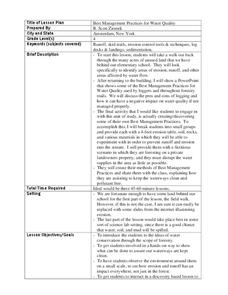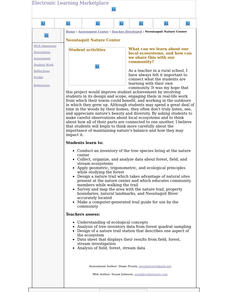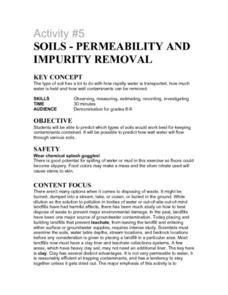Curated OER
Healing Fallen Warriors
Students read ancient Greek texts to explore evidence for healing wounds and compare ancient healing practices to those of modern times.
Curated OER
Inquiring Minds Want To Know
Eighth graders conduct a scientific experiment that help them explain the concept of nature versus nurture.
Curated OER
Our School's News
Students work collaboratively in small groups to create and edit various publications to promote their school's activities and accomplishments. Groups work to complete these publications and publish or update them bi-monthly.
Curated OER
The Water Cycle Dance
Second graders synthesize the four parts of the water cycle by participating in a water cycle dance. They perform movements that signify each stage of the cycle.
Curated OER
Biomes
In this biomes worksheet, students review the characteristics of aquatic biomes and terrestrial biomes. This worksheet has 12 fill in the blank, 6 multiple choice, and 4 short answer questions.
Curated OER
Clauses and Conjunctions
In this grammar worksheet, students read about clauses and conjunctions. Students read about the different kinds of clauses, such as dependent and independent.
Curated OER
How Appropriate is that Tree?
Students identify trees and their environments using a dichotomous chart. In this exploratory lesson students use the Internet to identify conditions needed for the trees and what the climate is in their area.
Curated OER
Proportion of the Human Form
Young scholars discover proportions of the Human Body. In this anatomy instructional activity, students create replicas of the Human body using nothing but paper and glue. Young scholars share their creations with the entire class.
Curated OER
Best Management Practices for Water Quality
Fourth graders examine best management practices for water quality. In this water quality instructional activity, 4th graders explore unused land to identify areas of runoff, erosion, and effects of water flow. Students discuss logging...
Curated OER
How Much Nutritional Value Does Rice Really Have?
Fifth graders see the nutritional value of rice. In this healthy eating lesson, 5th graders view the Food Guide Pyramid and the number of servings one is supposed to eat in each food group. They focus on rice and its benefits for the body.
Curated OER
Vocabulary: Kansas Prairies
Students explore the ecosystem by reviewing scientific vocabulary terms. In this environmental awareness lesson, students identify the differences between abiotic and biotic factors and their relationship to the Earth. Students define...
Curated OER
Verb Tenses Exercises
For this past simple and present perfect simple worksheet, students fill in the blanks to sentences with verbs in the correct tense, and rewrite sentences by choosing for or since to insert in the sentence. Students complete 10 problems...
Curated OER
Connecting the Dots: Workers and Their Importance
Students explore the role of workers and their jobs in the community. They write a friendly letter to a community worker expressing appreciation for the work they do and their importance to the community.
Curated OER
What's Your Average? What Do You Mean? I'm More Than Just Average
Upper grade and middle schoolers collect data, analyze and interpret the data. This three-part lesson should provide learners with a firm understanding about the differences between mean, median, and mode and how to perform the...
Curated OER
Lincoln's Legend and Legacy
Young scholars evaluate Lincoln's impact on American History. In this Civil War lesson, students view a film clip of writings about Lincoln. Young scholars take notes and compare how the writings define his legacy. Students write their...
Curated OER
Fisheries Research Methods
Learners explore how scientists keep track of fish populations and why it is important to do so. They describe three methods currently used to sample fish populations. They participate in activities to simulate several of the sampling...
Curated OER
Surface Water
In this surface water worksheet, students review water runoff, drainage basins, and river erosion. This worksheet has 7 multiple choice and 3 fill in the blank questions.
Curated OER
Neotaquit Nature Center: Ecosystems, Science, Technology
Young scholars survey their local forest conducting an inventory of tree species and analyzing data of local ecosystems. They design a nature trail, map the area and make a computer generated trail guide.
Curated OER
Water, Water Everywhere, and Nary a Drop to Drink!
Students sing the continent song and locate oceans between the continents on a map. They read "They Earth is Mostly Ocean" and copy notes into their journals. They watch a demonstration of water and saltwater evaporated to see what is...
Curated OER
Activity #5 Soils-Permeability and Impurity Removal
Students predict which types of soils would work best for keeping contaminants contained. They comprehend that in the past, landfills have been one major source of groundwater contamination. Pupils comprehend that placing and building...
Curated OER
Ocean Currents
In this currents worksheet, students review the Coriolis effect, surface currents, and density currents. This worksheet has 8 short answer questions.
Curated OER
Is Your Water Clean?
Students conduct tests of water samples from different sources, such as a local river, tap water, and an irrigation ditch. After determining which pollutants are present in each sample, students hypothesize the possible sources of the...
Curated OER
Science: Not just Gold
Students articulate a possible relationship between arsenic and gold deposits in a written statement using data to substantiate the relationship they describe. They use real data to determine the source of the arsenic in the drinking...
Curated OER
Trash...it really piles up!
Learners investigate a contemporary "midden" by analyzing trash collected from various sources and determining life-style choices people make. They see that reducing the amount of waste we generate is helpful to the the environment.

























